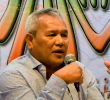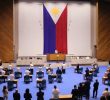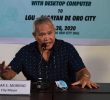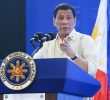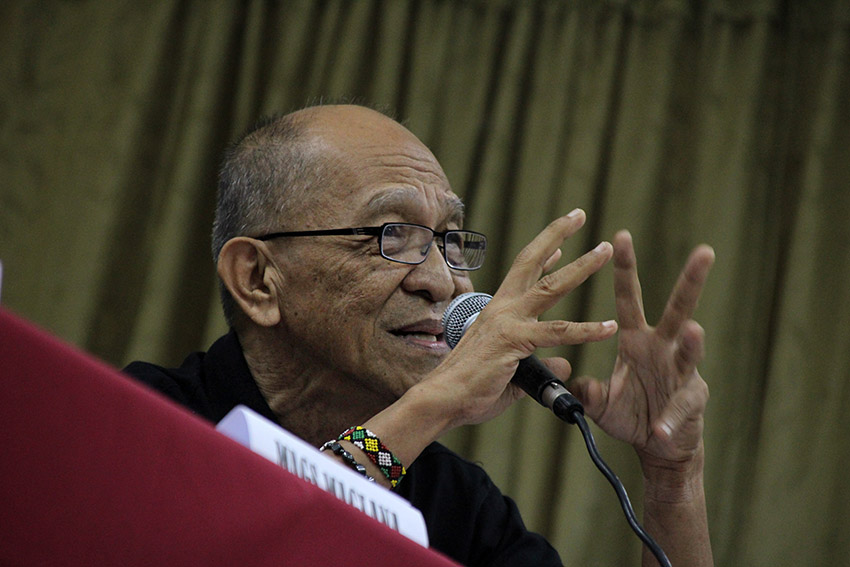
DUTERTE’S WORRIED CLASSMATE. Bro. Karl Gaspar, CSsr, an anthropologist and a political detainee during the Martial Law, says that if he could speak to his former classmate, President Rodrigo Duterte, he would tell him that he is worried about the campaign against illegal drugs that has already killed thousands of suspected drug-related personnel. Gaspar went to high school with Duterte in Holy Cross of Digos (now Cor Jesu College).(Paulo C. Rizal/davaotoday.com)
DAVAO CITY — A Redemptorist church brother who was also a classmate of President Rodrigo Duterte in high school expressed his worries about the ongoing war on drugs of his administration.
After lauding President Rodrigo Duterte’s thrust towards peace through his commitment to the peace talks with the Communist movement, as well as the Moro Islamic Liberation Front and the Moro National Liberation Front, Bro. Karl Gaspar,CSsR criticized Duterte’s anti-drugs campaign.
“How can you really have this very challenging work for peace when at the same time your resources, your time, your energy is so sucked into this war with such tragic consequences,” Gaspar said.
Gaspar made the comments in a forum titled “Translating Digong,” held in the the University of the Philippines Mindanao, September 19,Monday afternoon. He and Duterte studied high school in Holy Cross of Digos (now Cor Jesu College in Digos City) after the latter transferred from the Ateneo de Davao University.
“On my knees I have been praying that his presidency will succeed and really introduce radical transformation of our very sick republic. It is so sayang (such a waste) that on one hand there are very good initiatives of this presidency especially those of us suffering through decades of poverty, militarization and the war in Mindanao, and so on,” Gaspar said.
According to a report from the Philippine Center for Investigative Journalism, from July 1 to September 8 of this year, a total of 1,445 persons have been killed in police operations, 15,762 arrested, and 704,074 people who “surrendered”.
The rising number of extra judicial killings, associated to Duterte’s war on drugs has prompted his critics to compare his administration to former President Marcos’ martial law. Former chairperson for Committee on Human Rights and Senator Leila de Lima, once called Duterte’s war on drugs, a ‘Martial Law without declaration.’
“You wish him well, you really wish finally, there will be some radical changes in Philippine society. But, on the other hand, [I’m] really haunted by the memory of Martial Law. How can you not remember 14 years of horrific experiences,” Gaspar added.
Then an activist documenting human rights abuses, Gaspar was detained for 22 months, and arrested three times during the Martial Law years. Gaspar was defended by now peace adviser Jesus Dureza, also his high school classmate, then a lawyer doing ‘pro bono’ legal work for human rights victims against the government, which Duterte represented as prosecutor.
Duterte’s shift of persona
Gaspar also recounted the personality of a young Rodrigo Duterte whom Gaspar says was very “different” and “opposite” of who he was as mayor and especially now as the president.
“Because he was the son of the governor, which was the whole Davao at the time, he really came on as very spoiled. You know from Ateneo. You could already tell him apart as the one who grew up from the city from us who grew up in the province. His clothes, the way he carried himself, befitted someone who grew up from a place of privilege, not so much as a common man during high school,” Gaspar said.
This shift, Gaspar says from “the way he talks, the way he dresses, the way he walks” reflects Duterte’s “astuteness” in dealing with the electorate.
“He may not have studied cultural theories, but he has a very astute grasp of what it is, what kind of persona would really attract the people’s attention,” Gaspar said.
Gaspar encouraged the public, especially the youth to be more critical and to not be “seduced to the power of this imagery that we have developed” of the president.
“Unless we’re able to really ground ourselves within the manner in which we will analyze this persona, we can be so blinded by all the externalities in the manner that images are being projected,” Gaspar said.
Other speakers at the forum were UP Mindanao professors Nelfa M. Glova, Andrea Malaya Ragragio, columnist Mags Maglana, and Professor Vicente L. Rafael of the University of Washington, who also launched his book, Motherless Tongue. (davaotoday.com)


